Today Current Affairs: 30th April 2022 for UPSC IAS exams, State PSC exams, SSC CGL, State SSC, RRB, Railways, Banking Exam & IBPS, etc
Table of Contents
Museums Grant Scheme:

The Ministry of Culture and Tourism has granted Rs 3.75 crore under the ‘Upgradation of Museums Scheme’ as part of Museums Grant Scheme for the Rs 5-crore project in Eluru town, Andhra Pradesh.
- The scheme was launched in 2013.
- The Ministry of Culture provides financial assistance under the Scheme to the State Governments and Societies, Autonomous bodies, Local Bodies and Trusts registered under the Societies Act 1860, for setting up new Museums.
- It aims to strengthen and modernize the existing museums at the Regional, State and District level.
- The scheme also aims to develop at least 1 Central / State Government Museum located in the State Capital each year.
- Components:
- Establishment and Development of District and Regional Museums:
- Under this component museums have been classified into two categories:
- Category-I: Government-owned State level Museums and renowned Museums with exquisite collection.
- Category-II: all other Museums.
- The maximum amount of financial assistance provided under this Component is limited to Rs.10 crore.
- Financial assistance under this component is provided to existing renowned museums of the Central or State Government located in the Capital cities.
- The maximum financial assistance under this component is limited to Rs. 15 Crore per museum.
- Establishment and Development of Large-Scale Museums in Public Private Partnership Mode: Under this component, it is proposed to establish large scale museums as joint ventures with State Governments and the civil society in Public Private Partnership Mode.
- The maximum financial assistance provided under this component is 40% of the project cost subject to a maximum of Rs. 20 Crore per museum.
Anti-Ship Version Of The BrahMos Supersonic Cruise Missile:

An anti-ship version of the BrahMos supersonic cruise missile was successfully test-fired jointly by the Indian Navy and the Andaman and Nicobar Command.
- The Andaman and Nicobar Command is the only tri-services command of the Indian armed forces.
- BrahMos is a joint venture between the Defence Research and Development Organisation of India (DRDO) and the NPOM of Russia.
- BrahMos is named on the rivers Brahmaputra and Moskva.
- It is a two-stage (solid propellant engine in the first stage and liquid ramjet in second) missile.
- It is a multiplatform missile i.e it can be launched from land, air, and sea and multi capability missile with pinpoint accuracy that works in both day and night irrespective of the weather conditions.
- It operates on the “Fire and Forgets” principle i.e., it does not require further guidance after launch.
- Brahmos is one of the fastest cruise missiles currently operationally deployed with speed of Mach 2.8, which is nearly 3 times more than the speed of sound.
- Earlier, the Indian Air Force (IAF) successfully test-fired the BrahMos missile from a Sukhoi fighter jet.
- Recently, the Indian Navy also successfully test-fired an advanced version of the Brahmos missile from a stealth destroyer in the Indian Ocean.
- Following India’s entry into the MTCR (Missile Technology Control Regime) club in June 2016, the range is planned to be extended to 450 km and to 600km at a later stage.
- The BrahMos missile was initially developed with a range capped at 290 km.
Karnataka Anti-Cow Slaughter Legislation: Highlights
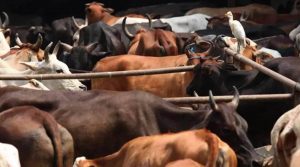
Accusing the Government of creating fear psychosis among farmers using the Karnataka Prevention of Slaughter and Preservation of Cattle Act, a convention of dairy farmers has demanded that the legislation be scrapped at the earliest in their interest.
- Police were harassing farmers by using the provisions of the legislation.
- While farmers are under watch by banning cow slaughter, the sale and export of beef by corporates has not been banned.
- Farmers are banned from selling their cows to slaughter houses even if they were infertile. This results in more number of farmers, particularly dairy farmers, quitting agriculture and allied activities.
- Even the transport of cattle had become difficult as farmers needed to take permission from various authorities concerned even for it.
- The Government should buy infertile cows from farmers at market rates till it withdraws the legislation.
- The word ‘cattle’ in the legislation is defined as “cow, calf of a cow and bull, bullock, and he or she buffalo below the age of 13 years”.
- Police officers ranked sub-inspector and above or a competent authority will have the power to search premises and seize cattle and materials used or intended to use to commit the offence.
- Such seizures, if any, will then be reported before the Sub Divisional Magistrate without unreasonable delay.
- It is a cognizable offence, violators can attract three to seven years of imprisonment.
- While a penalty between Rs 50,000 and Rs 5 lakh can be levied for the first offence, second and subsequent offences can attract penalties ranging between Rs 1 lakh and Rs 10 lakh.
World Book And Copyright Day 2022:

To promote awareness on the benefits of reading books, World Book Day, also known as World Book and Copyright Day 2022 is observed every year on April 23.
- The day is celebrated by UNESCO and other related organisations across the world to honour authors, and books, promote the art of reading, etc.
- In 2022, the World Book Capital is the Mexican city of Guadalajara.
- The World Book Capital of 2021 was Tbilisi, Georgia.
- The theme for World Book and Copyright Day 2022 is “Read, so you never feel low”.
- UNESCO has selected 23rd April as World Book Day to pay tribute to great literary figures including William Shakespeare, Miguel Cervantes, and Inca Garcilaso de la Vega who died on this day.
Cyber Breaches:

India’s nodal cybersecurity agency, Computer Emergency Response Team (CERT-In) has taken the following steps to prevent Cyber Breaches:
- All service providers, intermediaries, data center providers, corporates, and government organizations have to report cyber incidents within six hours of their detection.
- The new directions require virtual asset, exchange, and custodian wallet providers to maintain records on KYC and financial transactions for a period of five years.
- Companies providing cloud, virtual private network (VPN) will also have to register validated names, emails, and IP addresses of subscribers.
- Service providers will also have to provide information and assistance to CERT-In for any action taken to mitigate the impact of the cyber incident.
- To ensure the chain of events is accurately reflected in the time frame, service providers have been asked to connect and synchronize all their ICT systems clocks to the Network Time Protocol (NTP) Server of the National Informatics Centre (NIC) or National Physical Laboratory (NPL).
The directions have been issued under the provisions of sub-section (6) of section 70B of the Information Technology Act, 2000 after CERT-In found certain gaps that were “causing hindrance to incident analysis”.
- CERT-In said these directions will enhance “overall cybersecurity posture” and guarantee “safe and trusted Internet” in the country.
NTP :
- is a protocol used for reliably transmitting and receiving accurate time sources over TCP/IP-based networks. It is used for synchronizing the internal clock of computers to a common time source.
CERT-In:
- CERT-In is the national nodal agency for responding to computer security incidents as and when they occur.
- The constituency of CERT-In is the Indian Cyber Community.
- CERT-In was established in 2004 as a functional organization of the Ministry of Electronics and Information Technology.
Global Security Initiative : China
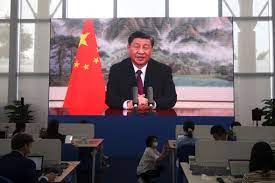
A new Global Security Initiative put forward by Chinese President Xi Jinping will look to counter the U.S. Indo-Pacific strategy and the Quad — the India, U.S., Australia, Japan grouping — according to Chinese officials.
- Xi last week first proposed what he called a Global Security Initiative, speaking at the Boao Forum in China, warning against “hegemonism, power politics and bloc confrontation”.
- China would like to propose a Global Security Initiative, which would “oppose unilateralism, and say no to group politics and bloc confrontation.”
- This would “oppose the wanton use of unilateral sanctions and long-arm jurisdiction”, appearing to refer to Western sanctions.
- China’s proposed security initiative would “oppose” what he called “the destruction of the international order under the banner of so-called ‘rules’ and the dragging of the world under the cloud of the ‘new cold war’”, and would “build an Asian security model of mutual respect, openness and integration”.
- China’s Foreign Minister Wang Yi had also taken aim at the Quad last month, suggesting that the grouping was equivalent to the “Five Eyes” intelligence alliance involving the Australia, New Zealand, Canada, the U.S. and U.K. and the AUKUS pact, as a key element in what he called U.S. plans to build an “Asian NATO”
- The members of the Quad have rejected the notion that it is an Asian NATO or a military alliance, and pointed to its broad-based cooperation, including on vaccines and technology.
National Curriculum Framework:
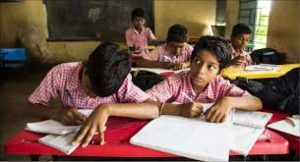
Union Education Minister will be launching the Mandate Document of National Curriculum Framework (NCF) on 29th April, 2022.
- The National Education Policy (NEP), 2020 recommends the development of National Curriculum Frameworks (NCF) in four areas- School Education, Early Childhood Care and Education (ECCE), Teacher Education and Adult Education.
- For providing inputs for the development of these, four curriculum frameworks, 25 themes based on the perspectives of the NEP, 2020 are identified under the three categories, viz.,
- Curriculum and Pedagogy
- Cross-cutting Issues
- Other important areas of NEP, 2020 focussing on systemic changes and reforms.
- The Mandate Document describes the development process of the NCF, its expected structure and objectives, and some of the basic principles from the NEP 2020 that will inform the development of the four NCFs.
- The NCF is being drafted through a collaborative and consultative process, starting from district to state level and then National level.
- The ‘Guidelines for Position Papers for the Development of the National Curriculum Framework’ is an integral part of this Mandate Document.
Azadi Se Antyodaya Tak:
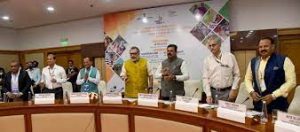
Union Minister for Rural Development & Panchayati Raj Shri Giriraj Singh today launched ‘Azadi Se Antyodaya Tak’, a 90-day campaign with a mission to saturate 75 Districts across 28 States/UTs with beneficiary schemes of 09 central ministries.
- Celebrating the spirit of the year- long Azadi Ka Amrit Mahotsav (AKAM), the identified districts are aligned with the birth place of 99 Freedom Fighters, who made the ultimate sacrifice for the nation during India’s struggle for independence.
- The goal of the campaign is to take up 17 select schemes with direct assistance to beneficiaries in saturation mode, reaching out to the person at the bottom of the pyramid in rural areas by each of the participating ministries/departments.
- The 75 districts, marginally lagging behind in the development parameters, have been shortlisted through MPCE (Monthly per Capita Indicators) and D5/D7 SECC-2011 (Socio-Economic Caste Census) data.
MSME Sustainable (ZED) Certification Scheme:
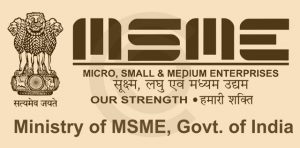
Union Minister for Micro, Small and Medium Enterprises launched the MSME Sustainable (ZED) Certification Scheme.
- This Scheme is an extensive drive to enable and facilitate MSMEs adopt Zero Defect Zero Effect (ZED) practices and motivate and incentivize them for ZED Certification while also encouraging them to become MSME Champions.
- Through the journey of ZED Certification, MSMEs can reduce wastages substantially, increase productivity, enhance environmental consciousness, save energy, optimally use natural resources, expand their markets, etc.
- Under the Scheme, MSMEs will get subsidy as per the following structure, on the cost of ZED certification:
- Micro Enterprises: 80%
- Small Enterprises: 60%
- Medium Enterprises: 50%
- There will be an additional subsidy of 10% for the MSMEs owned by Women/SC/ST Entrepreneurs OR MSMEs in NER/Himalayan/LWE/Island territories/aspirational districts.
- In addition to above, there will be an additional subsidy of 5% for MSMEs which are also a part of the SFURTI OR Micro & Small Enterprises – Cluster Development Programme (MSE-CDP) of the Ministry.
- Further, a limited purpose joining reward of Rs. 10,000/- will be offered to each MSME once they take the ZED Pledge
- A provision of up to Rs. 5 lakh(per MSME) will be made available for handholding and consultancy support for MSMEs under ZED Certification for assisting them to move towards Zero Defect Zero Effect solutions.
Amendment In Civil Registration System:

According to the 2020-21 annual report of the Ministry of Home Affairs (MHA), the Central government is planning to revamp the Civil Registration System (CRS) to enable the registration of birth and death in real-time with minimum human interface that will be independent of location.
- The RGI (Registrar General of India) is empowered under Section 3(3) of the Registration of Births and Deaths (RBD) Act, 1969 to take steps to coordinate and unify the activities of Chief Registrars of Births and Deaths of all States
- Civil Registration System (CRS) in India is the unified process of continuous, permanent, compulsory and universal recording of the vital events (births, deaths, stillbirths) and characteristics thereof.
- The data generated through a complete and up-to-date CRS is essential for socio-economic planning.
Proposed Amendments:
- Updating for New Changes due to Birth and Death:
- There is a need to update the NPR (National Population Register) again, first collated in 2010 and updated in 2015 with Aadhaar, mobile and ration card numbers “to incorporate the changes due to birth, death and migration.
The CRS system is facing challenges in terms of timelines, efficiency and uniformity, leading to delayed and under-coverage of birth and death.
- To address the challenges faced by the system in providing prompt service delivery to the public, the Government of India has decided to introduce transformational changes in the Civil Registration System of the country through an IT [information technology] enabled backbone leading to registration of birth and death on a real-time basis with minimum human interface.
- The changes would be in terms of automating the process delivery points so that the service delivery was time-bound, uniform and free from discretion.
- The changes would be sustainable, scalable and independent of the location.




